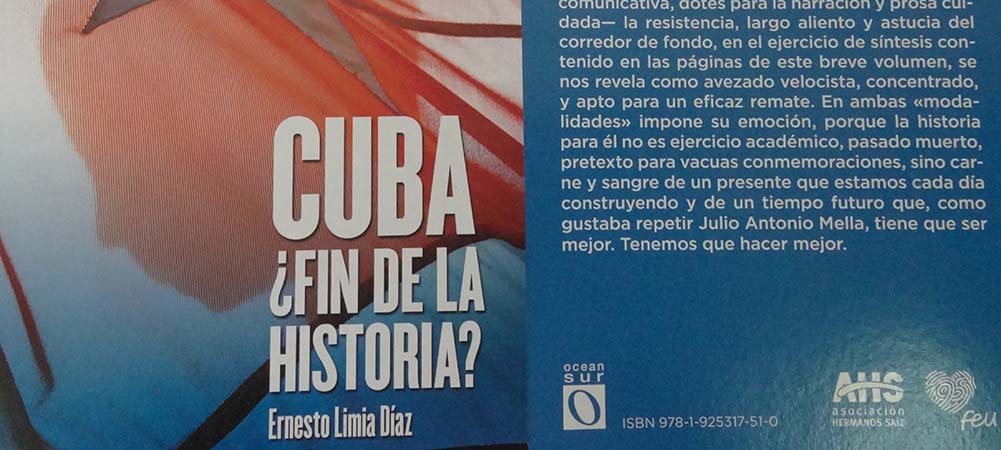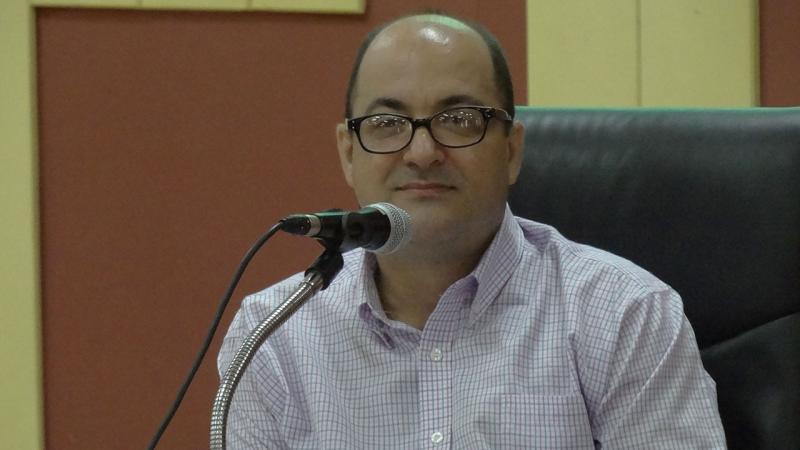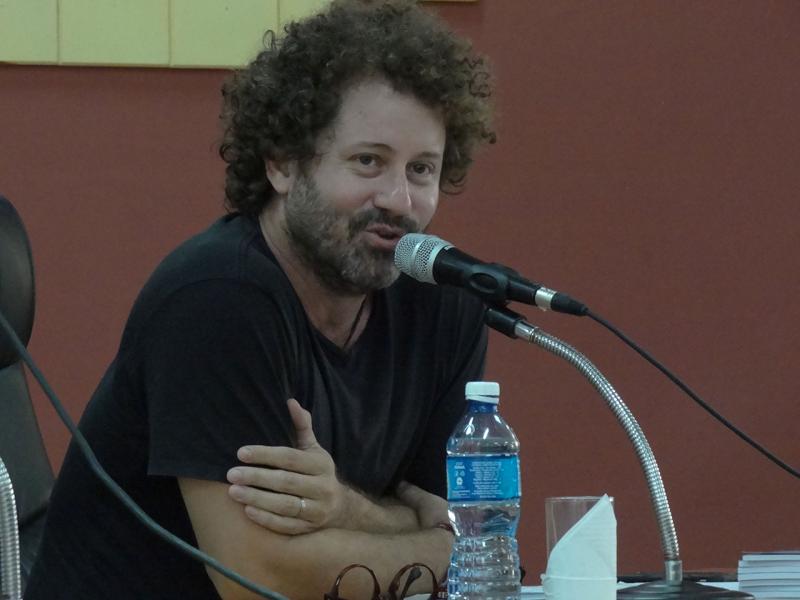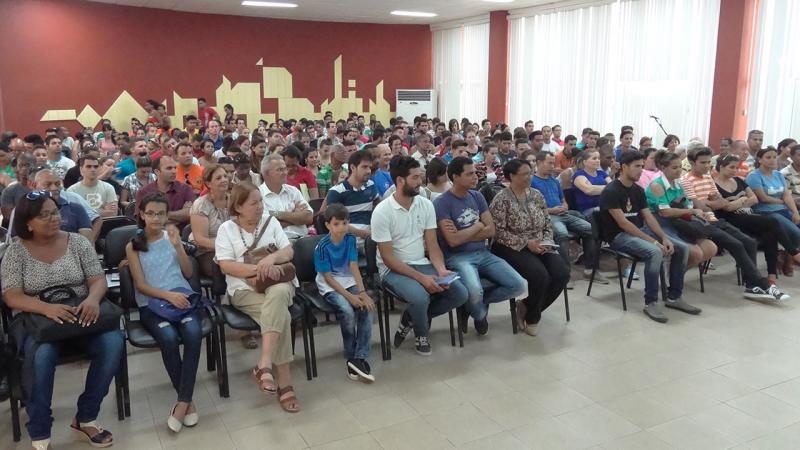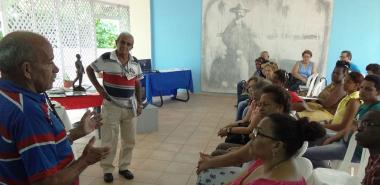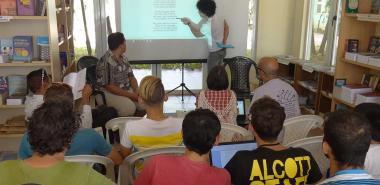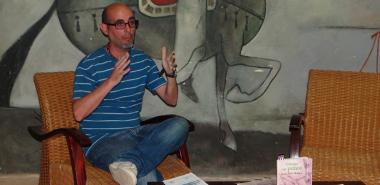Cover and back cover of the book Cuba: End of History ?, by author Ernesto Limia Díaz. Photo: Alberto Medina Cruz.
It is not the end of History in Cuba
The book Cuba: "End of History", by the writer Ernesto Limia Díaz, was presented on Wednesday, June 14, 2017, in the Conference Room of School Building 4 at the University of Informatics Sciences (UCI) Both the author and the singer-song writer Raúl Paz were present there.
The university Rector, Dr. Sc., Miriam Nicado García, as well as managers, staff members and students attended the debate activity, which has been taken around all the universities of the country, in relation to the 95th anniversary of the University Student Federation (FEU), as part of an initiative that has been called Diálogos itinerantes... Pa´ conectar sentimientos (Itinerant dialogues...to connect feelings)
Before the presentation of the work, which elicited comments and questions in accordance with these times, Limia and Paz thanked UCI for the support provided to make the tour happen.
In his words Raúl expressed: "What is written here (in the book), grabs you and teaches you. What captivated me most of all was the intelligence that flows from it. "
One of the young participants in the talk asked what is happening with the Cuban identity; he also highlighted how pleased he felt with the fact that in the five chapters --considered as lessons on their own – the world Culture is significantly important.
The author drew everyone’s attention to the need of a profound and creative teaching of history at all times, without excessive academicism, in order to favor the education of the new generations.
Ernesto Limia Díaz captivated the large audience with his arguments
“What does end of history mean?” “Read the book!” It is the question we have to ask ourselves today and also next year, but the most important thing is neither today nor next year, because I know the answer today and will know it next year. We must be asking ourselves this question within five years
"Nothing is black and white that is why we need to know History, so that we are not fooled by wordiness. But what is urgent today is finding intelligent answers. Our country is being painted as if we were still. That's a lie!
"A deep and creative teaching of history is essential at all times, without excessive academicism, in order to favor the education of the new generations".
At the conclusion of the presentation, the book was donated to all the participants in the debate. The book was published by the Latin American publishing house Ocean Sur, which offers its readers the voices of revolutionary thinking in Latin America of all times, inspired by ethnic, cultural and gender diversity, struggles for national sovereignty and an anti-imperialist Spirit.
This publishing house gave away five thousand copies of the book for free distribution in Cuba.
ABOUT THE AUTHOR.
Ernesto Limia Díaz was born in the city of Bayamo in 1968. He is a specialist in Information Analysis. He has got a Law Degree and holds a Diploma in International Migrations and Economics, as well as Doctor of Science. He is also a Doctor in Sciences and is currently the counselor of the Cuban Ministry of Culture.
He has published articles in national newspapers and also essays on economics and historical issues in specialized media. He is the author of Cuba entre tres imperios: perla, llave y antemural [Cuba amid Three Empires: Pearl, Key and Forefront], published by Editions Bologna, 2012 and Verde Olivo Publishing House, 2014) and Cuba Libre. La utopia secuestrada(Free Cuba. The utopia kidnapped) by Verde Olivo Publishing House, Havana, 2015).
Limia often performs critical analyzes with a constructive spirit on current particularities and their relationship with previous stages.
CRITICISM OF THE BOOK:
Singer-songwriter Raúl Paz: "It is a daring, provocative and profound text that requests a sincere dialogue ... the reflections of its pages are essential and symbolize lights in the complex current circumstances."
Poet and essay writer Juan Nicolás Padrón: "I recommend these pages as a valuable text that must be taken into account in lesson planning, because they contribute to forming the essential historical and political culture so as not to get lost within the contemporary world scene."
Cuban Minister of Culture, Abel Prieto Jiménez: "Although very profound, the work is quite accessible and can be read as a novel; it captivates the reader as it travels constantly from the geopolitics of past times to the personal microworld of a historical figure." (...) I believe Limia intends to shake us, to make us realize the challenge that Cuban revolutionaries are facing today. "
Source: www.granma.cu


